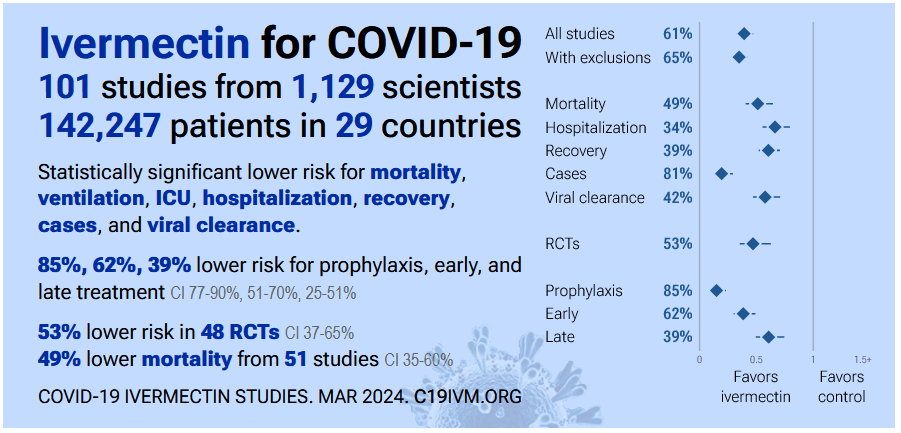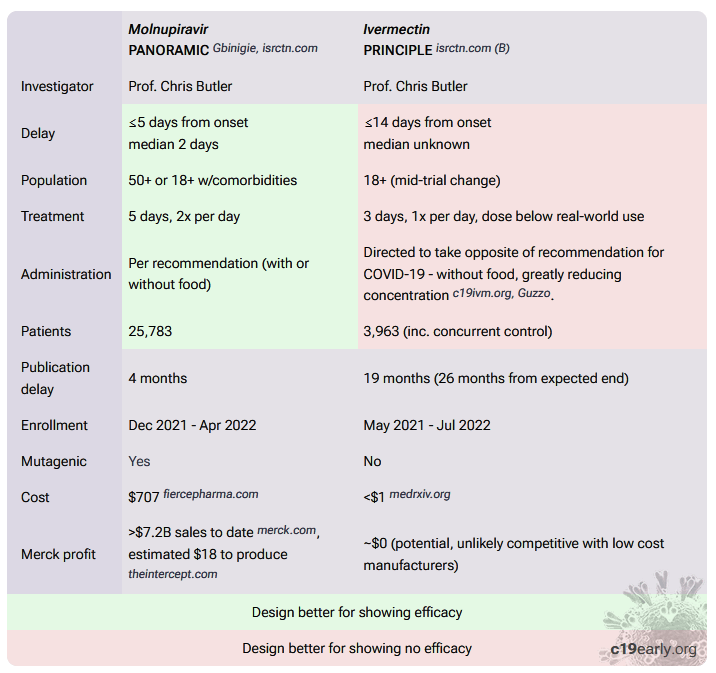
There are lots of ways to screw up, delay, distort and blur a medical study
And the Principle Trial did all of them.
So here we are, years too late, getting another nanomole of truth squeezed through the distortion field. The Principle Trial gave people ivermectin far too late, and told them not to take it with food, both of which stop it being useful — yet despite that, ivermectin still saved lives and produced a statistically significant benefit. So the researchers sat on the results for a year and a half, then wrote it up with the opposite conclusion. Welcome to modern industrial medicine where the experiments are just a theatre performance. The government pretends to care and set up a big study, while they design it to fail and then hide and twist the results.
The point of doing experiments is not to find the truth but to kill it. If the crowd is baying for answers, what better way to silence them than to say you are doing a long indepth “glorious” study that takes years to complete?
It was naked sabotage…

Viruses multiply exponentially at the start of an infection, so every hour matters. The sooner an antiviral drug is started, the smaller the total viral load will be, and most likely, the shorter the infection. By the time symptoms start the virus has run amok and 1 little virion may have turned into one million virions per ml — headed for a billion. So the Principle Trial designers made sure to express deliver the artificial patented Molnupiravir drug to the randomly selected patients, while the people selected in the ivermectin arm were signed up in slow motion. Pierre Kory has the whole sordid story. One poor man claimed that after he tested positive, he had to wait 11 days for his enrollment form to come through. Ivermectin could hardly “shorten his illness” if he’s already recovered. And conversely it could hardly save his life if he was already dead.
It was so petty (but thoroughly so) that the information forms for the Molnupiravir test told patients medicine would be delivered the “next day”, and patients were given the option to pick up the medicine from the pharmacy even faster. But in the Ivermectin arm the words “next day” were deleted — the medicine would just be delivered (sometime).
The excellent c19ivm team listed the differences in the trial design, and practically name a hundred different kinds of bias. It’s as if no stone was left unturned to get a “null” result on ivermectin.
As Pierre Kory says so scathingly — the same person designed both trials:
“The reason why the above table is so powerful is that the two trial designs were by the same Principal Investigator at the same “august” institution. Why such discordant designs? Why did Butler (notice my refusal to call him Professor), when studying ivermectin, use such a low dose on an empty stomach for such a short duration (no other anti-viral is ever used for less than 5 days), so late in the disease (up to 14 days?), in more mildly ill patients?”
Despite the sabotage, the Epoch Times reports ivermectin treated patients died at less than half the rate:
People who tested positive for COVID-19 and took ivermectin as a treatment recovered faster than a comparison group…
The time to self-reported recovery was a median of two days faster among the ivermectin recipients, according to the large UK study.
People who received ivermectin were also less likely to be hospitalized or die, with 1.6 percent of ivermectin recipients being hospitalized or dying versus 4 percent of the comparison group, which received typical care, which in the UK is largely focused on managing symptoms.
About 2,000 people were given ivermectin (of a sort) and about 3,000 were given “usual treatment”. 11 people died in the normal treatment arm, but only 2 died when given ivermectin.
The biggest crime was that for three years people were denied the best treatment they could get.
Statistical games

As Pierre Kory points out, the results must have looked so good they couldn’t possibly release them. Apparently they suddenly needed to extend the trial for a whole years followup and create some excuse about how ivermectin didn’t make some arbitrary hazard ratio bar they set post hoc.
Kory remarks that in their results of “time til recovery” the probability ivermectin was superior was found to be >.999. Yet their conclusion was that “Ivermectin is unlikely to provide clinically meaningful treatment” (especially if you want to keep the hospitals full eh?) Furthermore they say, it’s not worth doing more trials. (Big Pharma will be happy about that).
The new “Hazard Ratio Bar” they invented is chicanery:
So the authors concluded that this finding was unlikely to provide a clinically meaningful result? What? I want to be brief here, but this is statistical chicanery – to support this statement they instituted an almost impossible bar to clear, that of a “pre-specified hazard ratio level that must be greater than 2.0.” I have never heard of this. A hazard ratio does not need a pre-specified level. If the HR is > 1.0, and it is statistically significant, it is a robust finding. The HR for ivermectin was a statistically significant 1.15! But it was not 2.0, so .. dismiss the result? Whatever.
Wow. just wow. Another way of saying the above is that they literally designed the statistical threshold for effectiveness in such a way that, even if ivermectin was found to be effective (which they found), if it was not like, am (arbitrary) “super large magnitude” of efficacy, it should not be recommended or thought effective. What? — Pierre Kory
Despite the extraordinary lengths they went to, ivermectin still helped. Imagine what it could have done if it was used properly?
In another study done in Brazil – ivermectin reduces deaths by 92% for 10 cents a week. It could have saved so many…

REFERENCE
Hayward et al (2024) Ivermectin for COVID-19 in adults in the community (PRINCIPLE): an open, randomised, controlled, adaptive platform trial of short- and longer-term outcomes, Journal of Infection on Feb. 29 2024.
Drowning clock by 51581 from Pixabay
